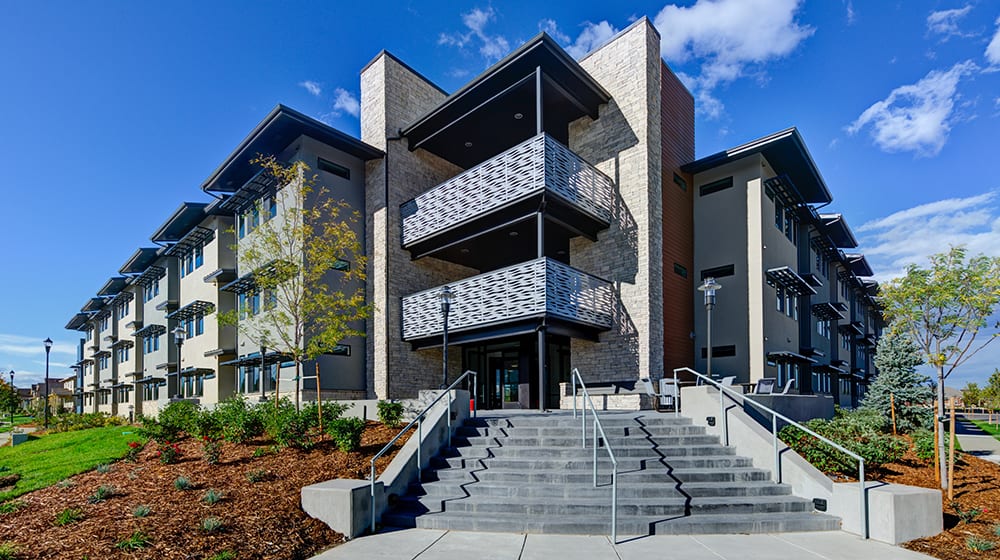A recent Colorado Mesa University poll showed that residents across the state call housing affordability the biggest issue facing their communities. Many Colorado municipalities and counties – rural, mountain, suburban and urban – have enacted policies to ensure they maintain or grow their supply of affordable and workforce housing. This article highlights four of those approaches.
While zoning ordinances that require affordable rental units generally are considered unconstitutional in Colorado, inclusionary zoning ordinances that apply only to for-sale development are not. Cities like Durango, Aspen, Boulder, Glenwood Springs, Crested Butte and Vail all have required a set-aside of a percentage of for-sale units in a housing development for many years.
For example, in 2008, Durango instituted a “Fair Share Policy” that requires any development of three or more units to set aside 16 percent of the units as affordable or pay a fee-in-lieu. The funds raised from fees-in-lieu are directed to a local nonprofit, HomesFund, which provides mortgage assistance and other services to qualified homebuyers. San Miguel County has required new developments, including hotels, ski developments and other commercial projects, to mitigate the impact of their developments by building deed-restricted workforce housing. While each municipality has created its own parameters to meet the needs of its community, most require 10 to 20 percent of units to be set aside, designate the affordability level for area median income and offer the alternative of a fee-in-lieu with those fees being directed toward creation of additional units.
Commercial or residential linkage fees generally charge developers a per-square-footage fee and use the proceeds to fund affordable housing projects. Aspen, Denver, Boulder and Eagle County all have instituted linkage fees. Commercial linkage fees are a popular approach in resort towns because commercial development increases the demand for workforce housing.
Municipalities across the state have explored density incentives to add affordable housing stock. Crested Butte will waive two-thirds of the tap fee for accessory dwelling units that are deed-restricted affordable rental units. Denver recently allowed height incentives in certain neighborhoods, where developers will be able to build up to 16 stories in exchange for building a certain percentage of income-restricted apartments or condos.
The city of Longmont Affordable Housing Incentive Program is one of the oldest and most comprehensive. It offers incentives to for-sale and rental projects that meet the following criteria:
- 10 percent of for-sale units must be affordable to households at or below 80 percent of the AMI, by selling for a price determined by the city, updated annually, and units must be kept affordable for a minimum of 10 years;
- 10 percent of the rental units must be affordable to households at or below 50 percent of the AMI, by renting for an amount determined by the city, and units must be kept affordable for a minimum period of 30 years.
If the affordable housing minimum requirements are met, developers and property owners may be eligible to receive expedited development review processing, height/density bonuses of up to a 20 percent increase in density/height over what is allowed per zoning code and fee waivers. Some development fees can be reduced in a range from 50 to 75 percent for for-sale units and from 20 to 50 percent for rental units. Subsidies for water/sewer system development fees also are available. Projects that provide more than the minimum required affordability may qualify for a percentage of the fees to be subsidized.
With Airbnbs and VRBOs becoming more popular, some municipalities have enacted policies to mitigate the effects of these short-term rentals on the availability of affordable, long-term housing. Boulder, for example, has extended licensing fees and taxes to short-term rentals and required that only the principal residence of an individual can be rented.
While no single policy can serve as a silver bullet in the development and preservation of affordable housing, municipalities across the state are taking creative steps with policies like those outlined above. Since every community faces a unique set of issues, exploring and enacting locally focused initiatives that best meet the needs of the community can be an effective way to respond and alleviate housing burdens in specific regions.














